
In the Luo culture children are seen as a gift from God and also an investment in the future. Children are born with the expectation that they'll contribute to the wellbeing of their family. They're trained to help with family chores almost from the time they can walk. Girls learn to carry water on their heads and to wash dishes and laundry at the lake. Boys often manage the
farm animals and learn to fish to help supplement the family's
 food. Kids of both sexes take care of their younger siblings. They carry children on their backs that often are almost as big as they are. In fact, there are some children that we have never seen without a child on their back.
food. Kids of both sexes take care of their younger siblings. They carry children on their backs that often are almost as big as they are. In fact, there are some children that we have never seen without a child on their back.
 Older children help plant and tend crops, re-thatch roofs, re-mud walls as well as all of the above chores. There are 2 boys who bring about a dozen cows over to our compound every morning before walking to school (which starts at 8AM). At lunch they come back to herd the cows to the lake for watering and then move them to a new grazing area before going home for lunch then back to school. When they get out of school at 5 PM they change and have about an hour of free time to play soccer (called football here) before they herd the cows and sheep home for the night. Because we're on the equator we have 12 hours of sun and darkness year around so it's always dark by about 6:30 PM. Dinner is usually served at 7PM and then homework is done by kerosene lamp.
Older children help plant and tend crops, re-thatch roofs, re-mud walls as well as all of the above chores. There are 2 boys who bring about a dozen cows over to our compound every morning before walking to school (which starts at 8AM). At lunch they come back to herd the cows to the lake for watering and then move them to a new grazing area before going home for lunch then back to school. When they get out of school at 5 PM they change and have about an hour of free time to play soccer (called football here) before they herd the cows and sheep home for the night. Because we're on the equator we have 12 hours of sun and darkness year around so it's always dark by about 6:30 PM. Dinner is usually served at 7PM and then homework is done by kerosene lamp.And while we're on the subject of school, it's only the "lucky kids" who get to go to school. In Kenya primary school is theoretically free but parents still have school fees, books fees, uniform fees...which many can't afford. All schools require a uniform but shoes are optional. Both boys are gi
 rls are supposed to have a close cropped haircut i.e.shaved head. The classrooms we've seen are very basic. There are homemade wooden desks and benches which are shared by 2-3 students. The classrooms are open to the air and have packed dirt floors. The bathrooms are outdoor latrines which are called a "choo". The curriculum is very rigorous with subjects similar to the US- math, spelling, geography, civics, religion, science and 2 languages- Kiswahili and English. Did I mention that they're forbidden to speak their mother tongue of Luo in school? Can you imagine taking classes in a "foreign" language from the age of 7?
rls are supposed to have a close cropped haircut i.e.shaved head. The classrooms we've seen are very basic. There are homemade wooden desks and benches which are shared by 2-3 students. The classrooms are open to the air and have packed dirt floors. The bathrooms are outdoor latrines which are called a "choo". The curriculum is very rigorous with subjects similar to the US- math, spelling, geography, civics, religion, science and 2 languages- Kiswahili and English. Did I mention that they're forbidden to speak their mother tongue of Luo in school? Can you imagine taking classes in a "foreign" language from the age of 7?The teachers and older students, who are like class monitors, have sticks they use as switches to hit the kids when they act up or to get them to move faster. I've seen them being hit and it makes a big scary noise like "thhhhhhhWAP"! It made me cringe but the kids never made a peep.
Most Luo families belong to a Christian church so children go to church on Saturdays or Sundays. There are Catholics and Protestants like we have in the US but also denominations that are
 unfamiliar to us. Some wear colored robes (the Legion of Mary) and others wear veil-type white hats with a red cross on them.
unfamiliar to us. Some wear colored robes (the Legion of Mary) and others wear veil-type white hats with a red cross on them.And their lives are not all work. Because homes are small and the weather is pleasant, they spend most of every day out of doors. It is safe enough for them to run free without parent's worrying. They know the rest of the village will keep an eye on them. Kids don't have store bought toys so they make their own toys, some of which are very sophisticated. They make airplanes by putting a paper propeller on a long stick and make them "fly" by running into the wind. Boats are made from old flip flops and twigs; balls made out of plastic bags and twine.
 Slingshots are made in a similar way although they sometimes looked crocheted and other times are made of old inner tubes.
Slingshots are made in a similar way although they sometimes looked crocheted and other times are made of old inner tubes. Trucks are made using plastic lids as wheels attached to bamboo handles. Girls play Chinese jump rope and cat's cradle, climb trees and swim in the lake. Tires of all sizes are used in a way my Dad described using them in his youth (in the 1920's). Even toddlers learn to roll truck tires in front of them and do so with great joy. I bet they never tell their parents that they're bored.
Trucks are made using plastic lids as wheels attached to bamboo handles. Girls play Chinese jump rope and cat's cradle, climb trees and swim in the lake. Tires of all sizes are used in a way my Dad described using them in his youth (in the 1920's). Even toddlers learn to roll truck tires in front of them and do so with great joy. I bet they never tell their parents that they're bored.Kenyan kids also have a very high risk of being orphaned before they grow up. Parents die of so many things- childbirth, malaria, snake bites, HIV.... There are thousands of orphaned kids living in the community. Many times a grandmother is raising them but sometimes it's
 someone unrelated but kindhearted. Sometimes the kids fend for themselves. We see them when they come into the clinic alone to be seen when they're sick and are so shy that they will barely tell us about their illness. Can you imagine going to the doctor's office alone when you were 7? The kids who are accompanied by someone can be brought in by a parent or a neighbor or even a random adult who had time to bring them in. Children are always well behaved, obedient, and quiet. Sometimes even when they get a shot or are getting stitches they don't cry. When I mentioned it to a woman we work with she said "Africans are tough!". She's right about that.
someone unrelated but kindhearted. Sometimes the kids fend for themselves. We see them when they come into the clinic alone to be seen when they're sick and are so shy that they will barely tell us about their illness. Can you imagine going to the doctor's office alone when you were 7? The kids who are accompanied by someone can be brought in by a parent or a neighbor or even a random adult who had time to bring them in. Children are always well behaved, obedient, and quiet. Sometimes even when they get a shot or are getting stitches they don't cry. When I mentioned it to a woman we work with she said "Africans are tough!". She's right about that.Now that I've told you how difficult their lives are I will tell you this. In spite of it all the kids here seem to be happy more times than not. They laugh easily, are playful and curious and enjoy little bitty things like receiving a new pencil. Gives you something to think about doesn't it? We think that they don't realize how hard their lives are because they have nothing to compare them with. They don't see images on TV or in movies that make them want what they can't have so instead of feeling deprived they are grateful for what they do have.
So, Sophie, thanks for your great questions and your interest in children living on the other side of the world. I think you'd love the kids here and I know they'd love you too.
Love, Aunt Darcie and Uncle Paul





























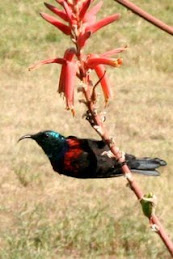

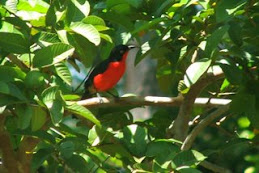







































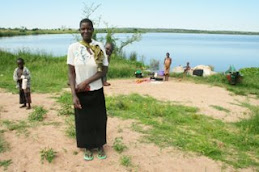

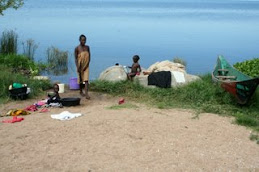

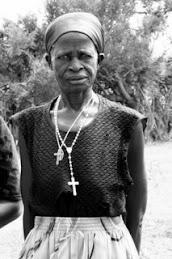






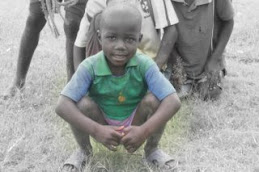


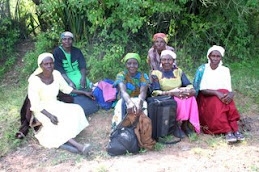

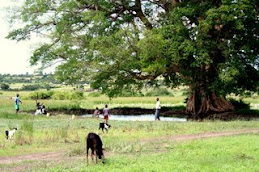
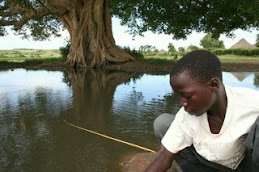
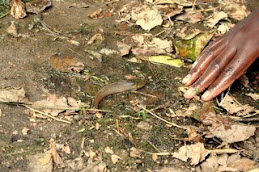



























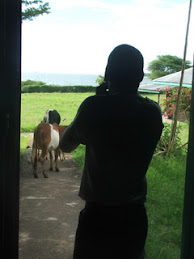

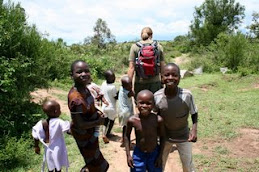











































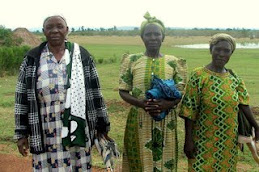

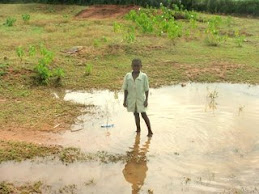





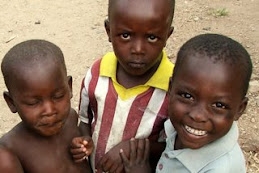


















No comments:
Post a Comment